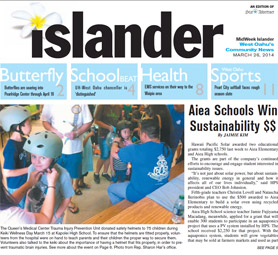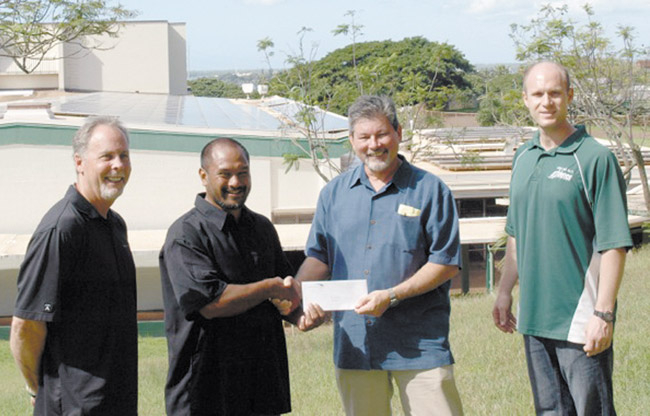Aiea Schools Win Sustainability $$
Hawaii Pacific Solar awarded two educational grants totaling $2,750 last week to Aiea Elementary and Aiea High schools.
The grants are part of the company’s continued efforts to encourage and engage student interested in sustainability issues.
wo-032614-solar-cover-2
“It’s not just about solar power, but about sustainability, renewable energy in general and how it affects all of our lives individually,” said HPS president and CEO Bob Johnston.
Fifth-grade teachers Christin Lovell and Natascha Berinobis plan to use the $500 awarded to Aiea Elementary to build a solar oven using recycled products and renewable energy.
Aiea High School science teacher Jamie Fujiyama Macadang, meanwhile, applied for a grant that will enable 300 students to participate in an aquaponics project that uses a PV system installed by HPS. The school received $2,250 for that project. With the aquaponics system, students will grow vegetables that may be sold at farmers markets and used as part of a home delivery service to students’ families.
The grants only were available to schools within the Aiea complex this year, but the company hopes to expand its educational outreach and make a second round of grants available to schools in the Kaimuki area for the 2014-2015 school year.
HPS, which was awarded a Power Purchase Agreement contract with the state Department of Education, has worked to install solar panels at various schools in Oahu and Kauai at no cost to the DOE.
In addition to installing the panels, HPS also has provided the schools with lesson plan materials and a flat-screen monitor that allows students to learn about the amount of energy being produced and its environmental benefits.
“I think that we all should, as individuals and as businesses, be concerned about our future and the … educational program, and our students are that future,” said Johnston.
“We have to be, I think, particularly mindful about our unique situation sitting in the middle of the Pacific and the important role that the future generations are going to take in dealing with those issues.”







